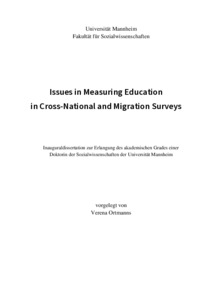|
Issues in measuring education in cross-national and migration surveys
Ortmanns, Verena
![[img]](https://madoc.bib.uni-mannheim.de/55867/1.hassmallThumbnailVersion/Dissertation_Ortmanns.pdf)  Vorschau |
|
PDF
Dissertation_Ortmanns.pdf
- Veröffentlichte Version
Download (1MB)
|
|
URL:
|
https://madoc.bib.uni-mannheim.de/55867
|
|
URN:
|
urn:nbn:de:bsz:180-madoc-558670
|
|
Dokumenttyp:
|
Dissertation
|
|
Erscheinungsjahr:
|
2020
|
|
Ort der Veröffentlichung:
|
Mannheim
|
|
Hochschule:
|
Universität Mannheim
|
|
Gutachter:
|
Wolf, Christof
|
|
Datum der mündl. Prüfung:
|
27 Juli 2020
|
|
Sprache der Veröffentlichung:
|
Englisch
|
|
Einrichtung:
|
Außerfakultäre Einrichtungen > Leibniz-Institut für Sozialwissenschaften (GESIS)
|
|
Lizenz:
|
 Creative Commons Namensnennung 4.0 International (CC BY 4.0)
Creative Commons Namensnennung 4.0 International (CC BY 4.0)
|
|
Fachgebiet:
|
300 Sozialwissenschaften, Soziologie, Anthropologie
|
|
Freie Schlagwörter (Englisch):
|
education , survey , comparative research , ISCED , survey characteristics , immigrants , language proficiency
|
|
Abstract:
|
Education is a central concept in social science research, and thus a key socio-demographic characteristic that is measured in almost every survey. Due to the importance and wide usage of education in empirical studies, this dissertation takes a closer look at this concept and the related education variables. In this thesis the quality of education variables from the perspective of survey organisers producing the data and of researchers using these data is assessed.
Dissertation papers I, II and III evaluate the quality of the widely used ISCED variable (International Standard Classification of Education) by assessing the reliability and comparability of this measure in ten cross-national surveys. These papers have a methodological focus, largely from the perspective of survey organisers who produce data. The papers highlight severe problems in the data quality of the resulting harmonised education variable. Major inconsistencies in the education distributions within countries and years indicate a lack of reliability at the aggregated level, which implies difficulties with data comparability, especially across surveys.
In contrast, dissertation paper IV has a substantive focus and uses the education variable as a proxy for cognitive competencies when assessing immigrants’ German language proficiency. In addition to this paper, a construct validation of different education measures is conducted to decide which variable to include in the main analysis of this paper. The results of the construct validation of different education variables show only small differences in the predictive power of these variables. The observed effect of education on immigrants' German language proficiency is in line with previous studies. In this paper, the perspective of a data user is reflected.
|
 | Dieser Eintrag ist Teil der Universitätsbibliographie. |
 | Das Dokument wird vom Publikationsserver der Universitätsbibliothek Mannheim bereitgestellt. |
 Suche Autoren in Suche Autoren in
Sie haben einen Fehler gefunden? Teilen Sie uns Ihren Korrekturwunsch bitte hier mit: E-Mail
Actions (login required)
 |
Eintrag anzeigen |
|
|
